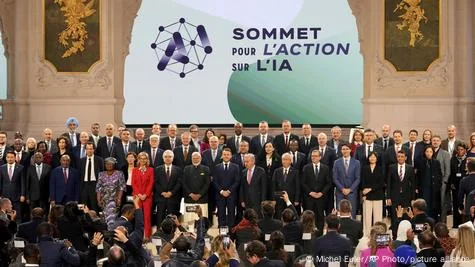- Web
- Feb 05, 2026
US and UK reject global AI declaration at Paris Summit, sparking concern over unified regulations
-

- Web Desk Karachi
- Feb 12, 2025

PARIS, FRANCE: The United States and the United Kingdom have opted not to endorse a declaration aimed at promoting ‘inclusive and sustainable’ artificial intelligence at a significant summit in Paris, undermining hopes for a unified strategy to advance and regulate the technology.
The communiqué outlines key priorities, including making AI open, inclusive, transparent, ethical, safe, secure, and trustworthy, while also considering international frameworks for all nations. It highlights the need for AI to be sustainable for both people and the planet. This document was supported by 60 other nations on Tuesday, including France, China, India, Japan, Australia, and Canada.
However, a spokesperson for the UK government stated that the declaration did not adequately address the global governance of AI or its implications for national security. “We concurred with many points in the leaders’ declaration and continue to collaborate closely with our international partners, as evidenced by our participation in agreements on sustainability and cybersecurity at the Paris AI Action summit today,” he noted.
“However, we believed the declaration lacked practical clarity on global governance and did not sufficiently tackle complex issues surrounding national security and the challenges posed by AI.”
The confirmation of the US and UK’s decision not to sign arrived shortly after US Vice President JD Vance criticized Europe’s “excessive regulation” of technology and cautioned against collaborating with China.
When asked whether the UK declined to sign in order to align with the US stance, a spokesperson for Labour leader Keir Starmer said they were “not aware of the US reasons or position” regarding the declaration.
A government source also dismissed suggestions that Britain was trying to appease the US. However, a Labour MP commented, “I think we have little strategic leeway but to follow the US.” They warned that US AI companies might withdraw their engagement with the UK’s AI Safety Institute—an esteemed research entity—if the UK pursued an overly restrictive approach to technology development.
Campaign organisations voiced their disapproval of the UK’s decision, arguing it could harm its reputation in the AI sector. Andrew Dudfield, who leads AI initiatives at Full Fact, asserted that the UK risks “undermining its hard-earned credibility as a global leader in safe, ethical, and trustworthy AI innovation,” stressing the need for “bolder government action to safeguard individuals from the harmful effects of AI-generated misinformation.”
Gaia Marcus, director of the Ada Lovelace Institute—which focuses on AI research—stated that the UK’s decision “contradicts the essential global governance that AI requires.”
Macron promotes France’s AI prowess at Paris Summit, trolls Trump
The Élysée Palace hinted that more countries might sign the declaration in the hours following the two-day summit. Vance’s speech, delivered in front of leaders like French President Emmanuel Macron and Indian Prime Minister Narendra Modi, reflected dissatisfaction with the current global framework for regulating and advancing AI technology. Starmer did not attend the summit, sending UK Tech Secretary Peter Kyle in his place.
During his address, Vance cautioned against excessive regulation of the AI sector, claiming it could stifle a transformative industry. He urged for international regulatory frameworks that encourage AI development rather than restrict it, imploring European allies to approach this emerging frontier with optimism instead of fear.
Vance also offered critical remarks concerning two EU regulations, the Digital Services Act (DSA) and the General Data Protection Regulation (GDPR). He specifically highlighted the DSA’s intent to regulate social media, arguing, “It’s one thing to prevent a predator from targeting a child online; it’s another entirely to prevent a responsible adult from accessing information the government deems misinformation.”
Furthermore, Vance warned against collaborating with “authoritarian” regimes, subtly referring to China, without naming the country directly. He pointed out the risks associated with exporting key Chinese technologies, such as CCTV and 5G equipment, from authoritarian governments, stating that such partnerships ultimately lead to negative outcomes: “Aligning with such regimes will never yield long-term benefits.”
Vance, in the beginning of his address also admonished the attendees against being overly fixated on safety, an apparent jab at the AI Safety Summit held in the UK earlier in 2023, which he felt was excessively cautious. He suggested that meetings on advanced technology can sometimes become “too self-conscious” and “too risk averse.”




